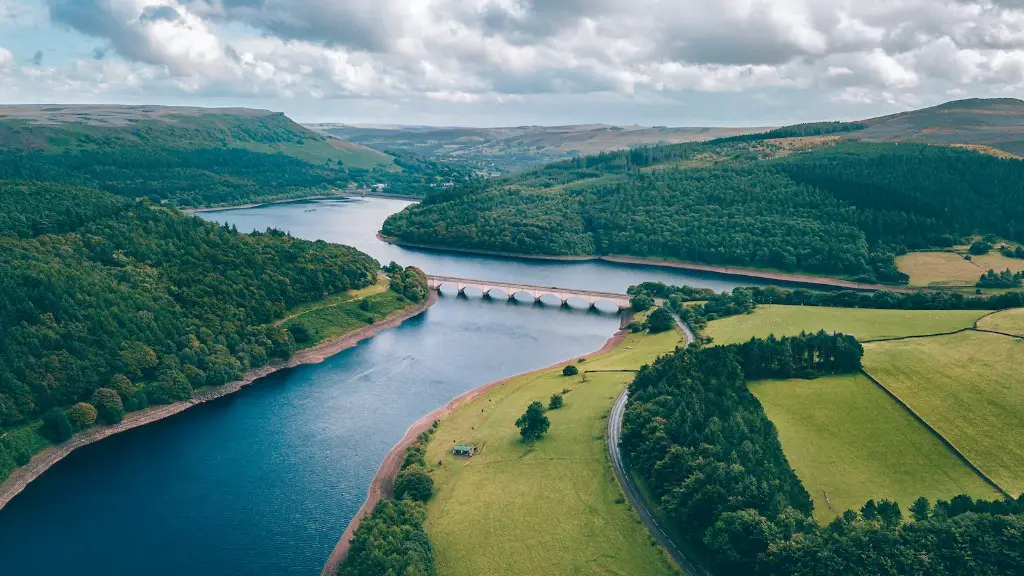Introduction
Agriculture is an integral part of the Mississippi River Basin, which spans parts of 31 U.S. States and two Canadian provinces. Agriculture has a direct and indirect influence on the health of this vital river system, which supports a wide variety of wildlife, recreation, and irrigation, and is home to more than twenty million people. In this article, we take a look at the impact of agriculture on the water supply, water quality, and economy of the Mississippi River Basin.
Impact on the Water Supply
Agriculture has a heavy influence on the water supply of the Mississippi River Basin. As the population of the area grows, so does water demand, leading to the development of man-made dams, locks, and levees along the river. These developments affect the volume, velocity, and fluctuations of the Mississippi River and its tributaries, leading to changing habitats, surges of runoff, and other problems. As a result, heavily developed areas along the river have an increased demand for water which further affects the volume and accessibility of water to other cities and towns in the region.
Influence on Water Quality
The presence of agricultural activities has a direct influence on water quality in the Mississippi River Basin. Fertilizers and chemicals used in agricultural production can run off into the river, creating eutrophication, which depletes the water’s oxygen supply and affects the health of aquatic life in the basin. In addition, sediment from eroded agricultural land can accumulate in the river, further reducing its capacity to hold fish and other aquatic animals.
Economic Effects
Agriculture is a mainstay of the economy in the Mississippi River Basin, providing employment, goods, and services to millions of people in the area. However, this economic activity also has negative impacts on the river’s health. By pushing forward large-scale agricultural operations such as large-scale drainage and crop rotation, the basin’s water levels can be severely impacted by water supply shortages or excess runoff. This can also has a negative economic effect on local businesses that depend on the river as a reliable source of freshwater.
The Effects of Changing Weather Patterns
Climate change and shifting weather patterns have a direct influence on agricultural activities in the Mississippi River Basin. Long episodes of drought can lead to soil erosion, depletion of the water table, and the impacts of these changes ripple throughout the region. Similarly, severe flooding can wash away topsoil, leaving soil vulnerable to erosion and damaging agricultural production.
Agricultural Management
Some agricultural operations in the Mississippi River Basin have taken measures to reduce their impact on the environment in the region. This includes the implementation of conservation practices such as no-till farming to reduce soil erosion, the use of cover crops to reduce runoff and fertilizer application, and the installation of buffer strips to trap sediment and control runoff. In addition, farmers in the region are conscious of their water usage and are working to reduce their impacts on local waterways.
Sustainable Farming
The future of agriculture in the Mississippi River Basin is closely linked to the concept of sustainable farming. By taking steps to reduce the negative impacts of conventional farming practices, farmers can help to ensure the long-term health and vitality of the river. Sustainable practices such as crop rotation, nutrient management, erosion control, and water conservation can help to minimize the environmental impact of agriculture on the region and ensure a more sustainable future.
Impacts on Wildlife
Agriculture has an influence on the wildlife of the Mississippi River Basin, both through direct and indirect impacts. Direct impacts include the destruction of wildlife habitats as a result of drainage and cultivation activities. Indirect impacts include the use of chemical fertilizers and pesticides, which can lead to the contamination of water sources and the depletion of nutrients in the surrounding environment. In addition, agriculture can also affect the migratory patterns of certain species of fish, leading to declines in population over time.
Effects on Recreation
Agriculture has an impact on the recreational activities associated with the Mississippi River Basin, such as fishing, boating, and bird watching. As a result of nationwide declines in water quality, recreational activities in the region have suffered. Polluted water can cause a variety of health problems, from skin and respiratory irritation to serious illnesses, and can also reduce the number and diversity of fish species. In addition, runoff from agricultural activities can pollute the water, making it unsuitable for recreational use.
The Impact of Human Development
Agriculture is not the only factor influencing the health of the Mississippi River Basin. The development of cities and towns along the river has also had an impact, leading to increased levels of runoff, pollution, and water supply problems. In addition, human development of the region has caused the destruction of natural habitats and adversely affected the migration patterns of some species of fish.
Conclusion
Agriculture has a pervasive influence on the health of the Mississippi River Basin, affecting the water supply, water quality, and the environment. The implementation of sustainable farming practices, increased regulation and oversight of water usage, and the reduction of human development in the region are all essential steps in ensuring a healthy and sustainable future for the region.


